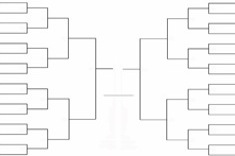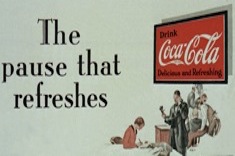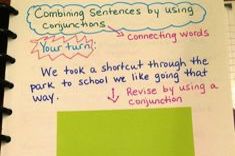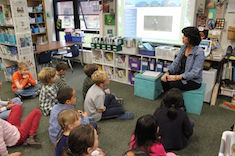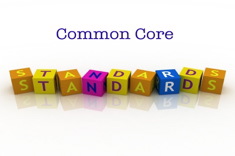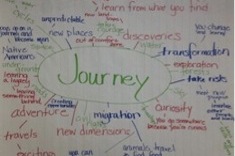5th
Latest Content
Reading Through Spring
Gigi McAllister has many suggestions for a strong reading finish to the school year.
April Literacy Contracts: Discovery
Megan Ginther and Holly Mueller choose a theme of discovery for their April literacy contracts.
Conferring About Independent Reading
Karen Terlecky confers with Alex, a fifth grader who needs help choosing books for independent reading.
Remembering to Slow Down at the End of the School Year
Maria Caplin shares her strategies for slowing down at the end of the year with her fifth graders and reflecting on the growth and learning that can't easily be measured with tests.
Celebrating Screen-Free Week (BOOKLIST)
Screen-Free Week is scheduled for May 5-11 this year. Here are some book suggestions to help you explore the issue with students.
Getting Started with Blogging in Fifth Grade
Katherine Sokolowski presents some strategies from her fifth-grade classroom for launching student blogs.
A Booklist for Earth Day
Earth Day is celebrated on April 22. Sarah Klim presents some favorite titles to share with students and build awareness in this booklist.
Expanding the Literacy Classroom with Flipped Minilessons
Katharine Hale tries some flipped minilessons in her fifth-grade classroom and explains how technology is providing new opportunities for student learning.
Word Observations
Max Brand describes how word observations can work as powerful minilessons in elementary classrooms.
Simplifying Word Study
Max Brand has suggestions for simplifying word study.
March Literacy Contracts: Nonfiction Curiosities
This month’s literacy contract for middle school students focuses on nonfiction texts and growing independence in the classroom.
Bracketology
Mary Lee Hahn uses bracketology to help her fifth-grade students explore determining importance in short texts and close reading.
The Pause That Refreshes: Write When the Conversation Gets Hot
When’s the best time for some spontaneous opinion writing? Suzy Kaback argues it’s when class conversations get hot.
Sentence Combining in Workshops
Heather Rader has strategies for using sentence combining in literacy workshops.
A Tool Worth Exploring: Sentence Combining
Heather Rader begins a new series on sentence combining, an alternative to traditional drill and kill grammar instruction.
Making the Most of Short Texts
Mary Lee Hahn melds short texts with the Common Core in this first article in a two-part series.
Children’s Literature for the Olympics
The Olympics are just around the corner, and Sarah Klim has suggestions for read alouds in a new booklist.
Making Classics Relevant for Middle School Students
Jennifer Schwanke helps middle school students make connections between classics and their current reading.
Explanatory Grammar Moves: Getting Verbal with It
Jeff Anderson concludes his series on explanatory grammar moves by exploring participles, included in the Common Core eighth-grade standard covering the use of verbals.
15 Minutes on Friday: Writing on Demand with Students
Mary Lee Hahn finds 15 minutes of writing on Friday builds fluency and confidence in her fifth-grade students, and gives her a wealth of formative assessment data at the same time.
Jennifer Serravallo on Formative Assessment (PODCAST)
Franki Sibberson chats with Jennifer Serravallo about formative assessment in this podcast. Jennifer is the author of The Literacy Teacher’s Playbook, Grades 3-6: Four Steps for Turning Assessment Data into Goal-Directed Instruction.
Formative Spelling Assessment
Max Brand has developed templates for grades K-2 and 3-5 to use for formative spelling assessments.
Liberty and Dystopia: February Literacy Contracts
Megan Ginther and Holly Mueller focus their February Literacy Contracts on dystopias.
The Shape of Stories
Mary Lee Hahn explores story structure with her fifth-grade students. This is a terrific activity for helping older students understand increasingly complex story structures as they move through the intermediate grades.
Common Core Research Shifts
Maria Caplin explains four changes she is making in her fifth-grade classroom with writing instruction because of the Common Core.
Keep Going
Ruth Ayres has advice for moving forward, staying positive, and focusing on what’s important.
Journeys and Quests: January Literacy Contracts
Middle school teachers Megan Ginther and Holly Mueller focus on journeys and quests as the theme of their January Literacy Contracts in the latest installment of their year-long series.
Explanatory Grammar Moves: Right-Branching Sentences
Jeff Anderson continues his Explanatory Grammar Series with a feature on the power of right-branching sentences.
Spelling Cycles: An Alternative to Weekly Spelling Lists
Max Brand developed Spelling Cycles as an alternative to weekly spelling tests. He explains how they work with an example from a third-grade class.
Mock Newbery Club
Katherine Sokolowski has suggestions for organizing and hosting a Mock Newbery Club in the weeks before the award is given in late January.
Browse Content By
Type
Category
- Assessment Tools
- Big Fresh Archives
- Booklists
- Choice Numeracy
- Classroom Design
- Common Core
- Community Building
- Conferring
- Content Literacy
- Digital Literacy
- English Language Learners
- Equity
- Family Relations
- Free Samples
- Guiding Groups
- Leadership
- Literacy Coaches
- Mentor Texts
- Minilessons
- New Teacher Mentors
- Podcasts
- Poetry
- Quote Collections
- Reading Strategies
- Self Care
- Struggling and Striving Learners
- Talking and Listening
- Teacher Study Groups
- Teaching Reading
- Teaching Writing
- Word Study and Vocabulary
Author
- Melissa Quimby
- Nawal Qarooni
- Gwen Blumberg
- Julie Cox
- The Lead Learners
- Hannah Tills
- Josie Stewart
- Ruth Metcalfe
- Mallory Messenger
- Becca Burk
- Jodie Bailey
- Vivian Chen
- Mary Brower
- Tiffany Abbott Fuller
- Stephanie Affinito
- Ruth Ayres
- Leigh Anne Eck
- Heather Fisher
- Shari Frost
- Julie Johnson
- Suzy Kaback
- Gigi McAllister
- Shirl McPhillips
- Melanie Meehan
- Cathy Mere
- Debbie Miller
- Tara Barnett and Kate Mills
- Tammy Mulligan
- Dana Murphy
- Bitsy Parks
- David Pittman
- Brenda Power
- Heather Rader
- Matt Renwick
- Mandy Robek
- Christy Rush-Levine
- Gretchen Schroeder
- Jen Schwanke
- Brian Sepe
- Katherine Sokolowski
- Stella Villalba
- Jennifer Vincent
Grade Level
Choice Literacy Membership
Articles
Get full access to all Choice Literacy article content
Videos
Get full access to all Choice Literacy video content
Courses
Access Choice Literacy course curriculum and training












